Related Research Articles

Alexander Jannaeus was the second king of the Hasmonean dynasty, who ruled over an expanding kingdom of Judea from 103 to 76 BCE. A son of John Hyrcanus, he inherited the throne from his brother Aristobulus I, and married his brother's widow, Queen Salome Alexandra. From his conquests to expand the kingdom to a bloody civil war, Alexander's reign has been generalised as cruel and oppressive with never-ending conflict. The major historical sources of Alexander's life are Josephus's Antiquities of the Jews and The Jewish War.

Acre, known to locals as Akko or Akka, is a city in the coastal plain region of the Northern District of Israel.
Synesius, a Greek bishop of Ptolemais in ancient Libya, a part of the Western Pentapolis of Cyrenaica after 410, was born of wealthy parents at Balagrae near Cyrene between 370 and 375.
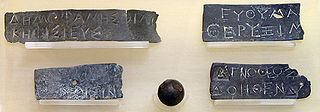
In Ancient Greece, a deme or demos was a suburb or a subdivision of Athens and other city-states. Demes as simple subdivisions of land in the countryside seem to have existed in the 6th century BC and earlier, but did not acquire particular significance until the reforms of Cleisthenes in 508 BC. In those reforms, enrollment in the citizen-lists of a deme became the requirement for citizenship; prior to that time, citizenship had been based on membership in a phratry, or family group. At this same time, demes were established in the main city of Athens itself, where they had not previously existed; in all, at the end of Cleisthenes' reforms, Athens was divided into 139 demes. to which one should add Berenikidai, established in 224/223 BC, Apollonieis and Antinoeis (126/127). The establishment of demes as the fundamental units of the state weakened the gene, or aristocratic family groups, that had dominated the phratries.
Ptolemais may refer to:

The Thebaid or Thebais was a region in ancient Egypt, comprising the 13 southernmost nomes of Upper Egypt, from Abydos to Aswan.
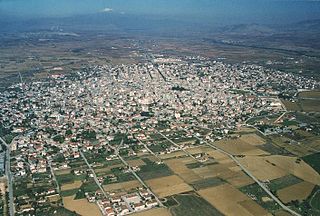
Ptolemaida, is a town and a former municipality in Kozani regional unit, Western Macedonia, Greece. Since the 2011 local government reform it is part of the municipality Eordaia, of which it is the seat and a municipal unit. It is known for its coal (lignite) mines and its power stations.
Ptolemais Theron was a marketplace on the African side of the Red Sea, whose location is now uncertain.
Demetrius the Fair or surnamed The Handsome, also known in modern ancient historical sources as Demetrius of Cyrene, was a Hellenistic king of Cyrene.

Ptolemais was one of the five cities that formed the Pentapolis of Cyrenaica, the others being Cyrene, Euesperides, Tauchira/Teuchira, and Apollonia.
Eurydice was a Queen of Egypt by marriage to Ptolemy I Soter.

Tolmeita, Tolmeta or Tolmeitha Arabic: طلميتة is a village in the northern Cyrenaica region of eastern Libya, some 110 km (68 mi) east of Benghazi, near Ad Dirsiyah. Its name is derived from Greek Πτολεμαΐς (Ptolemais), the name of the classical city of Ptolemais, whose ruins are nearby.

Barca, also called Barce, was an ancient city and former bishopric, which survives as both a Latin Catholic and an Orthodox titular see.

The Bishop of Acre was a suffragan bishop of the Archbishop of Tyre in the medieval Latin Kingdom of Jerusalem. Acre is present-day Akko, Israel.
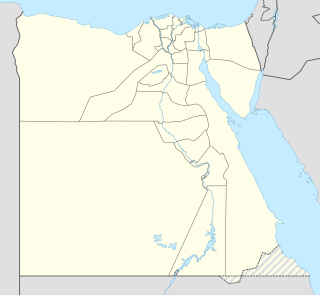
Ptolemais Hermiou, or Ptolemais in the Thebaid, was a city and metropolitan archbishopric in Greco-Roman Egypt and remains a Catholic titular see.
Secundus of Ptolemais was a 4th-century bishop of Ptolemais, excommunicated after the First Council of Nicaea for his nontrinitarianism.
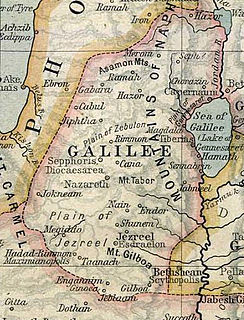
Ptolemais was an ancient port city on the Phoenician coast. It was also called Ptolemais in Phoenicia. It was an Ancient bishopric, which became a double Catholic titular see.
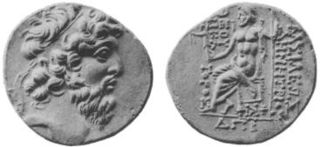
The Seleucid Dynastic Wars were a series of wars of succession that were fought between competing branches of the Seleucid royal household for control of the Seleucid Empire. Beginning as a by-product of several succession crises that arose from the reigns of Seleucus IV Philopator and his brother Antiochus IV Epiphanes in the 170s and 160s, the wars typified the final years of the empire and were an important cause of its decline as a major power in the Near East and Hellenistic world. The last war ended with the collapse of the kingdom and its annexation by the Roman Republic in 63 BC.
Sophronius II, served as Ecumenical Patriarch of Constantinople during the period 1775–80 and, as Sophronius V, Greek Orthodox Patriarch of Jerusalem in 1771–75.
Ptolemais was a coastal town of ancient Pamphylia or of Cilicia, inhabited during Hellenistic times. It was located between the Melas River and Coracesium.
References
| | This Israeli biographical article is a stub. You can help Wikipedia by expanding it. |
| | This article about an individual bishop is a stub. You can help Wikipedia by expanding it. |